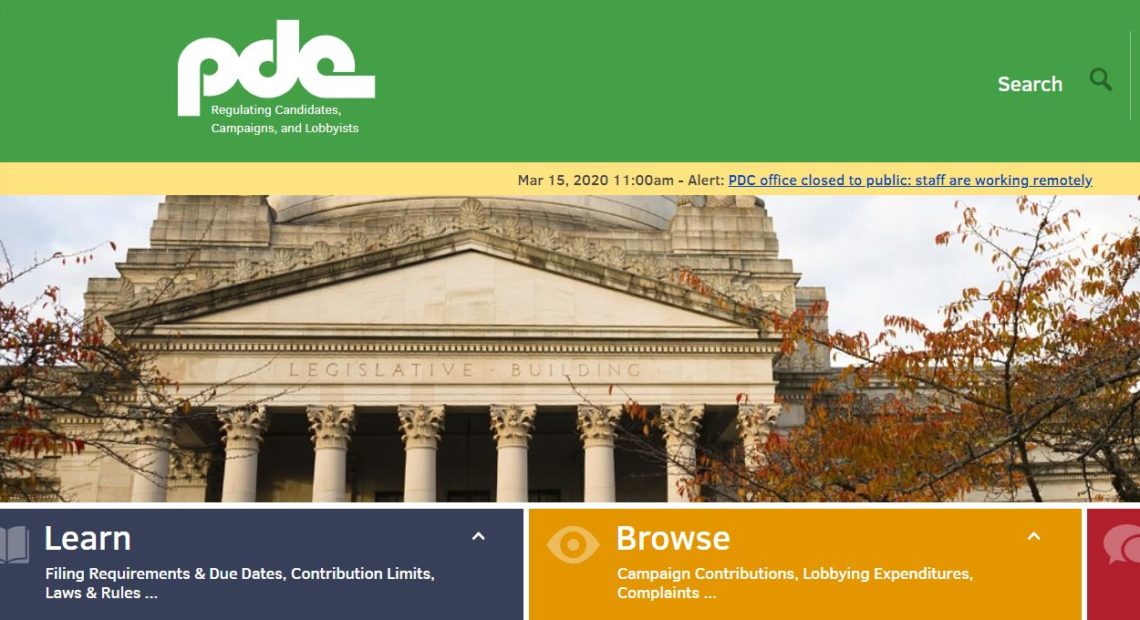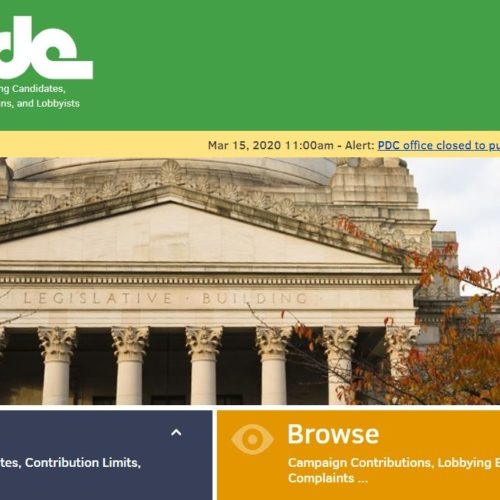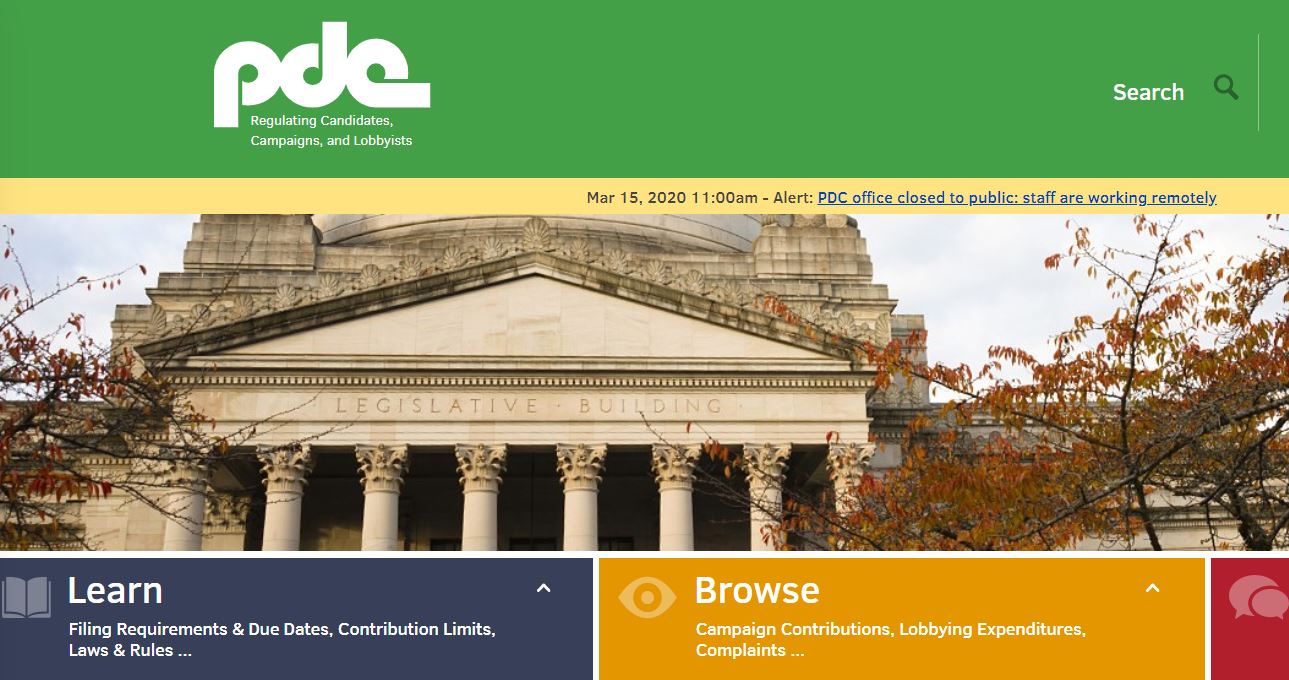
Washington Financial Disclosure Forms Will Go Back Online, Despite Opposition From Lawmakers
READ ON
Over the objections of a bipartisan group of nearly two dozen state senators, Washington’s Public Disclosure Commission (PDC) has decided to stick with its plan to repost online the financial disclosure statements of elected officials, candidates and other government officials following a one-month “pause” to review security concerns.
The F-1 statements, as they’re known, were taken offline last month following an urgent email with the subject line “Stop online posting of F1 data” from Democratic state Sen. Sam Hunt, the chair of the State Government committee which oversees the PDC.
In the wake of widespread unemployment insurance fraud, Hunt and fellow Democratic Senator Reuven Carlyle were concerned about the potential for bad actors to download the forms and use the information to commit identity theft or fraud.
Historically, F-1 forms were available only by request. But this year, following a lengthy review process, the PDC began posting them online to make the information easier for the public to access. In 2018, state lawmakers considered a bill to block the PDC from posting F-1s online, but the measure didn’t ultimately pass.
The forms include information about an individual’s financial holdings and interests, but do not include bank account or social security numbers. The purpose of the disclosures is so that journalists and citizens can see if elected officials or government appointees may have a conflict of interest.
In response to the alarm expressed by the senators last month, as well as red flags raised by the governor’s office and the state’s chief information officer, PDC Chair David Ammons said he directed agency staff to temporarily remove online access to the forms while the issue was reviewed.
On Thursday, during the commission’s regular meeting, Ammons reiterated his thinking behind the one month “pause.”
“The idea was to gather more information from cybersecurity experts and from legislators or others who had expressed concerns about personal, financial data being available online at this time,” Ammons said.
In a briefing to the five member commission, PDC Executive Director Peter Lavallee reported that there was no evidence bad actors had targeted the agency or the disclosure forms.
“We have no indication that any F-1 data when it was available online was used for nefarious purposes,” Lavallee said. “We have no indication that there’s been any security breach of PDC systems or state systems that the PDC utilizes.”
He also noted that the PDC had previously worked with lawmakers and other filers to ensure that sensitive information, like the names of minor children, did not appear in F-1 filings.
The commission also heard from the PDC’s chief information officer, James Gutholm, who explained that there are ways to make information available online, while at the same time discouraging actors with nefarious intent.
For instance, Gutholm explained, there are ways to discourage “casual browsing” or “bulk farming” of the data. The PDC could also require information of anyone accessing the F-1 data online.
Ammons called that information helpful, but cautioned that those methods could also frustrate the efforts of legitimate users and researchers to analyze datasets.
In the end, the commission took no action and instead allowed its previous vote to allow the F-1s to go back online on June 26 to stand.
“We do not believe our data is a unique set that is being abused by evil-doers,” Ammons said in an interview. “We felt that our commitment is to the spirit of disclosure and openness.”
On Thursday, Washington’s Office of Financial Management also confirmed it plans to put back online the state employees salary database on July 1. It was taken offline in the wake of the unemployment insurance fraud, which appeared to target a number of state employees.
Ammons added that the PDC is “not insensitive” to the concerns expressed and will “continue to be watchful” for the need to protect identities.
In response to the commission’s decision to allow the information to go back online, Sen. Hunt expressed frustration that the PDC wasn’t willing to do more to guard the information, while also emphasizing that F-1 information is public information.
“There is absolutely no quibble or qualm about that,” Hunt said. “The question is should you just leave the keys in the car and leave the garage door open and say ‘come get it’ – and that’s what the PDC action does,” Hunt said.
In a letter to the PDC, Democratic state Rep. Gerry Pollet, the chair of the House Local Government committee, took the opposite position.
“It is vital for openness in government and public trust, as well as ensuring against public official violations of ethical obligations and corruption, for F1 financial disclosure forms of elected officials to be posted online,” Pollet wrote.
Earlier this year, the Legislature considered, but did not pass PDC-proposed legislation that would have, among other things, raised the dollar amounts that trigger certain reporting requirements.
Going forward, Ammons said there will be a “continuing conversation” with legislators over F-1s and the information that’s disclosed.
“We’re certainly happy to talk about disclosure, but I think you will find the commission is committed to transparency in government, so we will sometimes agree with our legislative allies and sometimes we will disagree with them,” Ammons said.
The debate over posting F-1s online is expected to continue next month when the PDC commission has promised to once again review its decision to begin posting the F-1s of legislative staffers online beginning July 24. Some staffers, along with the Secretary of the Senate and Chief Clerk of the House, have voiced concern about that decision and are urging the commission to reconsider.
Related Stories:

After Unemployment Fraud, Washington’s Campaign Finance Watchdog Blocks Some Online Access
At the request of a powerful Democratic state senator who warned of “foreign intrusion,” Washington’s Public Disclosure Commission (PDC) on Sunday temporarily suspended public, online access to the personal financial statements of elected officials, candidates and other public officials.

Former Central Washington Judge, Business Owner Fined For Violating Campaign Finance Laws
Investigators found out former Grant County Superior Court Judge Jerry Moberg and Moses Lake business owner Ken Greene had financed the mailers but concealed it from state officials overseeing campaign finance.

Washington Affirmative Action Campaign Sued For Not Paying Signature Gatherers
According to Washington’s Public Disclosure Commission, the One Washington Equality Campaign still has $1.3 million in outstanding debt.
















